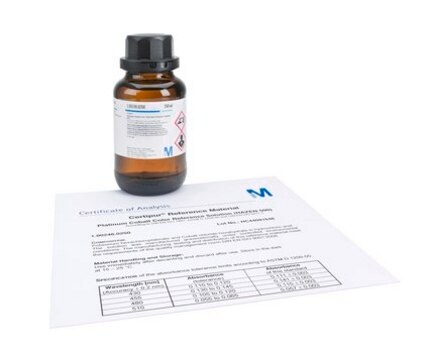206067
Potassium hexachloroplatinate(IV)
reagent grade, 98%
Synonym(s):
Dipotassium hexachloroplatinate, Dipotassium platinum hexachloride, Platinic potassium chloride, Platinum potassium chloride, Potassium chloroplatinate, Potassium platinum(IV) chloride, Potassium platinum(IV) hexachloride
About This Item
Recommended Products
grade
reagent grade
Quality Level
Assay
98%
reaction suitability
core: platinum
reagent type: catalyst
mp
250 °C (dec.) (lit.)
SMILES string
[K+].[K+].Cl[Pt--](Cl)(Cl)(Cl)(Cl)Cl
InChI
1S/6ClH.2K.Pt/h6*1H;;;/q;;;;;;2*+1;+4/p-6
InChI key
DPAIVKJGTXERIM-UHFFFAOYSA-H
Looking for similar products? Visit Product Comparison Guide
Related Categories
General description
Application
- K2PtCl6-PEG/SiO2 complex catalytic system for vapor-phase hydrosilylation reaction.
- Pt-decorated nickel pyrophosphate β-Ni2P2O7/Pt and nickel phosphate Ni3(PO4)2/Pt catalysts for the hydrogen evolution reaction (HER) by water splitting.
- Polypyrrole-platinum complex sphere catalyst for the decomposition of hydrogen peroxide to form oxygen.
Signal Word
Danger
Hazard Statements
Precautionary Statements
Hazard Classifications
Acute Tox. 3 Oral - Aquatic Acute 1 - Aquatic Chronic 1 - Eye Dam. 1 - Met. Corr. 1 - Resp. Sens. 1 - Skin Sens. 1 - STOT RE 1
Storage Class Code
6.1B - Non-combustible acute toxic Cat. 1 and 2 / very toxic hazardous materials
WGK
WGK 1
Flash Point(F)
does not flash
Flash Point(C)
does not flash
Personal Protective Equipment
Choose from one of the most recent versions:
Already Own This Product?
Find documentation for the products that you have recently purchased in the Document Library.
Customers Also Viewed
Our team of scientists has experience in all areas of research including Life Science, Material Science, Chemical Synthesis, Chromatography, Analytical and many others.
Contact Technical Service












